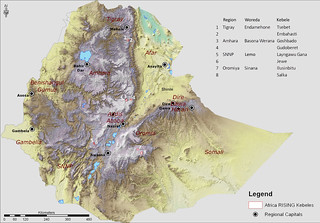Africa RISING project in the Ethiopian highlands lessons from Phase I
OnJanuary 24, 2017
0 Comments
 During phase I, the project has learned a number of lessons that will be key to designing an effective phase II that will generate development impacts at scale. These include issues around partnerships, capacity development, research management, budget utilization and specific approaches to exploratory and action research. The most significant of these lessons include:
During phase I, the project has learned a number of lessons that will be key to designing an effective phase II that will generate development impacts at scale. These include issues around partnerships, capacity development, research management, budget utilization and specific approaches to exploratory and action research. The most significant of these lessons include:
- Realizing the benefits of integrating SI interventions at household scale has been a mantra for all three Africa RISING projects during phase I. In practice, we have learned that integration of SI interventions does not happen concurrently. Farmers prefer to test one or two technologies at a time in order to assess workability and the benefits that they derive from them. Once they become confident with a limited number of technologies, they often proceed further down the intensification pathway by adopting further complimentary interventions. This stepwise approach to SI appears to be the reality for many farmers.
- Balancing short- and long-term benefits for households and communities is necessary to engage more farmers in the action research processes and reach more communities and areas.
- Tailoring technologies to local farm and landscape situations requires careful attention in order to get support from communities, extension and policymakers. This applies from the kebele to federal government level.
- Partnerships are key to bringing about the desired impacts. Engagement of local partners throughout the R in D process, building their capacity through a well-managed capacity building strategy and bridging gaps in facilities helps to build strong relationships and create positive working environments.
- The presence of Africa RISING project site coordinators and their assistants at site level was invaluable in facilitating communication amongst CGIAR centers and local partners and to follow up on the on-farm research. This model will evolve for phase II but could be broadly scalable to similar projects managed by CGIAR centers.
- The attachment of students for specific pieces of research is a cost effective approach for generating evidence on the management, utilization and effects of technologies, and bridging information gaps at both household and landscape levels.
- Periodic cross-learning visits can motivate farmers and extension agents to learn and adapt successful technologies and practices to their own localities.
- Innovation Platforms(IPs) and Farmer Research Groups (FRGs) have greatly enhanced communication among CGIAR and local partners, farmers and local policymakers on understanding system, identifying opportunities, conduct of research and review of results and impacts.
Excerpt from the Phase II proposal document
Read more in a recent presentation:
Mekonnen, K. and Thorne, P. 2017. Africa RISING in the Ethiopian highlands: Some phase I achievements. Presented at the Africa RISING Science for Impact Workshop, Dar es Salaam, 17-19 January 2017. Nairobi, Kenya: ILRI.




